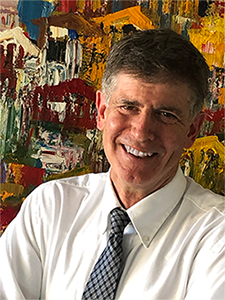
This September, John Fitzpatrick ‘87 celebrates 25 years as senior clinical instructor at the Harvard Prison Legal Assistance Project (PLAP). Throughout his tenure, Fitzpatrick has trained thousands of students to represent people incarcerated in Massachusetts prisons. Fitzpatrick’s tenacity, clear-sightedness, and dedication to pursuing justice for PLAP’s clients have left an indelible mark on his students, colleagues, and the HLS clinical community.
Fitzpatrick first joined PLAP as a student in 1984, providing representation for incarcerated clients during parole hearings. This first foray into prisoner representation became the touchstone of his career; he returned to PLAP in 1997 as the Student Practice Organization’s (SPO) supervising attorney.
“It’s hard to know where to begin when celebrating John’s 25 years here, because his contributions to PLAP have been so many and over such a long period of time,” says PLAP’s managing attorney Joel Thompson, who has worked alongside Fitzpatrick since 2014. “John began representing prisoners when it was neither popular nor widely accepted as necessary. He has set an example for generations of HLS students, in which the incarcerated client’s needs come first and are always top of mind.”
“John has both formidable trial lawyer skills and a deep understanding of the Massachusetts prison system and criminal legal system, and he is keenly perceptive about what motivates the various actors with whom we deal every day. PLAP’s students are the beneficiaries, as John works closely with them on case preparation and strategy, and in turn those students have for decades provided zealous advocacy to our incarcerated clients. But it is the clients who come first. When there is a coverage gap, a crisis developing, or a time-sensitive need that a student cannot cover, John will run out to prison to meet with clients, get a brief filed, or take whatever action is necessary.”
His students echo the sentiment, glad to receive the guidance Fitzpatrick offers based on his extensive experience in the field.
“John was really an amazing leader and a patient supervisor,” said J. Javier Secaira ‘20. “He humored my weird ideas and was always really encouraging. My confidence was shattered from experiences outside PLAP, but he really made me feel like I was capable. This inspired me to rise to what he told me I could be.”
“John helped through every stage of representing my client and was incredibly responsive, friendly, and informative. He gave great feedback and helped think through how to approach and develop the theory of the case,” said Madeleine Jackman ‘25.
“John always made time to speak with anyone who had a question or issue and had wonderful, thorough advice,” adds Samantha Fry ‘20. “He was both incredibly supportive and knowledgeable but also treated everyone as equals. He taught me how to represent a client faithfully and effectively, and how to maintain a positive attitude in challenging circumstances.”
Fitzpatrick has been a key member in the fight to improve Massachusetts’s prison systems: he led the rewriting of fairer prison disciplinary regulations that were adopted by the state in 2006, and he obtained court orders for the Parole Board to stop denying parole on the basis of a person’s disabilities, ending arbitrary and capricious practices in the parole and prison disciplinary process.
“But the far greater impact John has had on so many people’s lives is in the accumulation of hundreds, maybe thousands, of clients served by PLAP students under his supervision,” says Thompson. “Those students collectively pry open the lid of otherwise closed institutions, and they bring to light the truth about the daily conditions and deprivations to which prisoners are subjected. They humanize clients whom too many people would rather ignore or demonize. PLAP students challenge assumptions and ask uncomfortable questions, and in doing so over the course of decades, they force our government and the public to confront and reassess how we treat those we have imprisoned. They did so by working with, and learning from, John.”
Fitzpatrick’s steadfast leadership at PLAP has been critical to the evolution of the clinical programs. After the state adopted the rewritten regulations, Fitzpatrick noted the positive impact PLAP has had not only at HLS, but in our community as well: “Here’s a clinical program where students are making a significant and positive contribution to our society and where we have literally helped to rewrite a part of our state’s law for the better,” he said. “This is in keeping with the very best of the Law School’s tradition of public service.”
Congratulations, John!